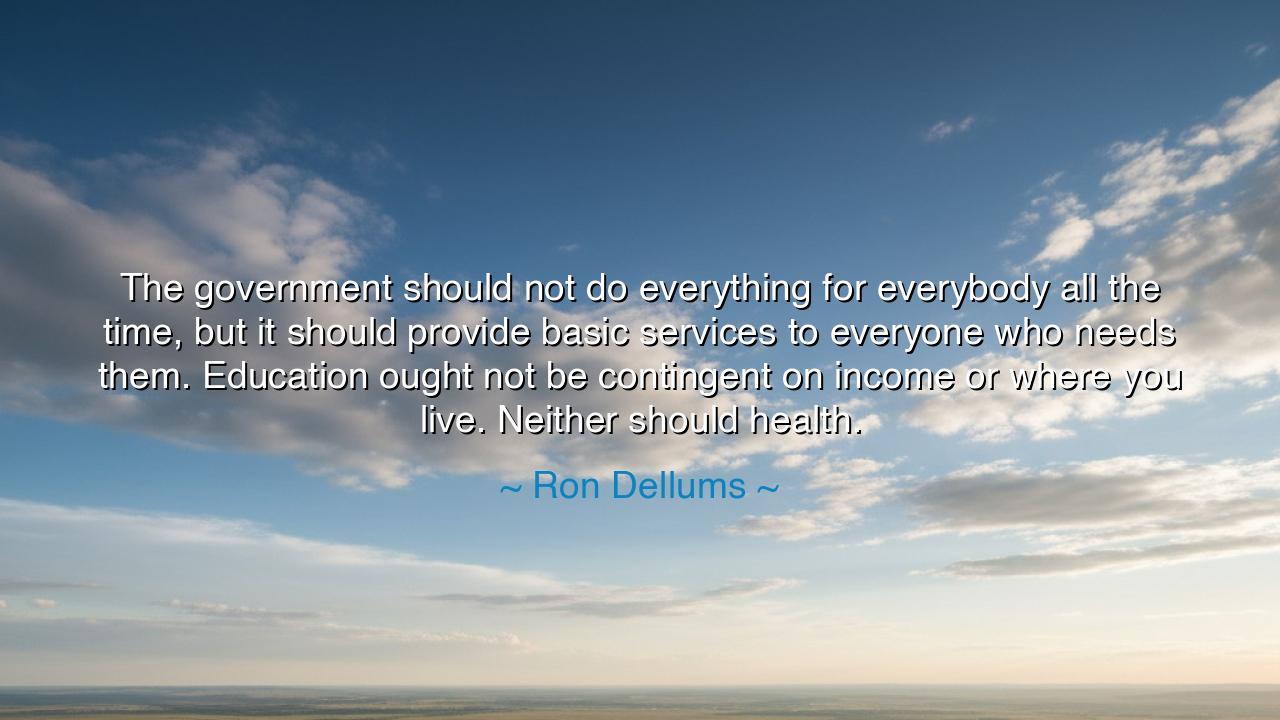
The government should not do everything for everybody all the
The government should not do everything for everybody all the time, but it should provide basic services to everyone who needs them. Education ought not be contingent on income or where you live. Neither should health.






The words of Ron Dellums, warrior of justice and servant of the people, echo like a trumpet across the ages: “The government should not do everything for everybody all the time, but it should provide basic services to everyone who needs them. Education ought not be contingent on income or where you live. Neither should health.” In this statement lies the balance between freedom and duty, between the might of the state and the dignity of the individual. Dellums calls not for a kingdom where citizens are made dependents, but for a society where no one is cast into darkness for lack of light, no one is left to perish for want of healing.
From the dawn of nations, rulers have wrestled with this question: what is the rightful role of government? The tyrant claims all, dictating the smallest details of life; the negligent ruler abandons his people to chaos. Dellums stands between these extremes, teaching that the state must be guardian, not master; provider of foundation, not controller of destiny. A people must be free to strive, to build, to dream, but their striving cannot blossom if their children are denied education or if their sick are abandoned without health. These, he declares, are not privileges for the wealthy but rights of all humanity.
History bears witness to this truth. In the early days of the United States, public schooling was not universal. Many children, especially the poor and those in rural lands, grew up without letters. It was Horace Mann, in the 19th century, who championed the cause of free public education, declaring that it was “the great equalizer of the conditions of men.” He saw, as Dellums did, that without learning, the poor are condemned to remain poor, chained in ignorance while the powerful rise higher still. And when education was spread more widely, the nation itself grew stronger, its democracy more secure, its people more free.
The same truth shines forth in the realm of health. Consider the story of Europe in the aftermath of the Second World War. Broken by conflict, many nations chose not to rebuild palaces first, but hospitals. They founded systems where even the poorest could be treated with dignity, believing that to heal the body of one citizen was to strengthen the body of the whole nation. Where health was made universal, society flourished; where it was withheld, division and despair multiplied. For how can a man labor for his dreams if disease lays him low and no hand comes to his aid?
Dellums himself, rising from humble beginnings, saw the injustice of wealth determining worth. He became a voice in Congress not for the mighty corporations but for the voiceless—the child in the ghetto who longed for a good school, the worker who feared the cost of a doctor’s visit. His words are not philosophy alone, but a battle cry forged from the suffering he witnessed. To him, basic services were the foundation of liberty, the soil from which true equality could grow. Without them, freedom is but a mask worn by privilege.
The lesson is clear for us, O heirs of tomorrow: the role of the government is not to carry you through every step of life, nor to dictate every choice you make. Its sacred role is to ensure that no citizen begins the race already broken, that no family must choose between knowledge and hunger, that no illness condemns the poor to death while the rich live on. Beyond that foundation, your life is your own, your dreams your own, your destiny the fruit of your labor.
Practical action lies before you: demand of your leaders not gifts, but justice; not endless handouts, but the assurance of equal access to education and health. Support schools that welcome all, hospitals that heal without prejudice, policies that protect the weakest without shackling the strong. And in your own lives, lift up your neighbor: tutor a child, aid the sick, advocate for fairness. In this way, you become co-builders of the vision Dellums proclaimed.
Thus remember: “The government should not do everything for everybody all the time, but it should provide basic services to everyone who needs them.” This is the balance of freedom and compassion, of strength and mercy. A nation that honors these words will endure in justice. A people who embody them will rise together, none left behind, all free to walk toward the light.






AAdministratorAdministrator
Welcome, honored guests. Please leave a comment, we will respond soon